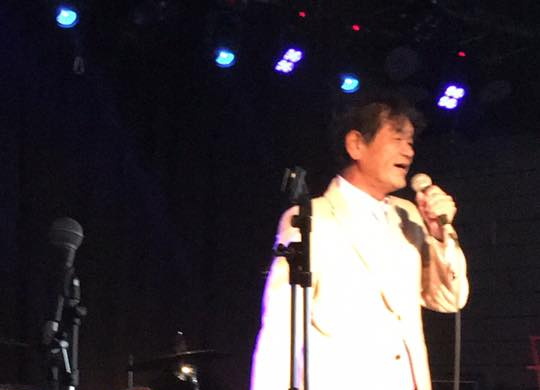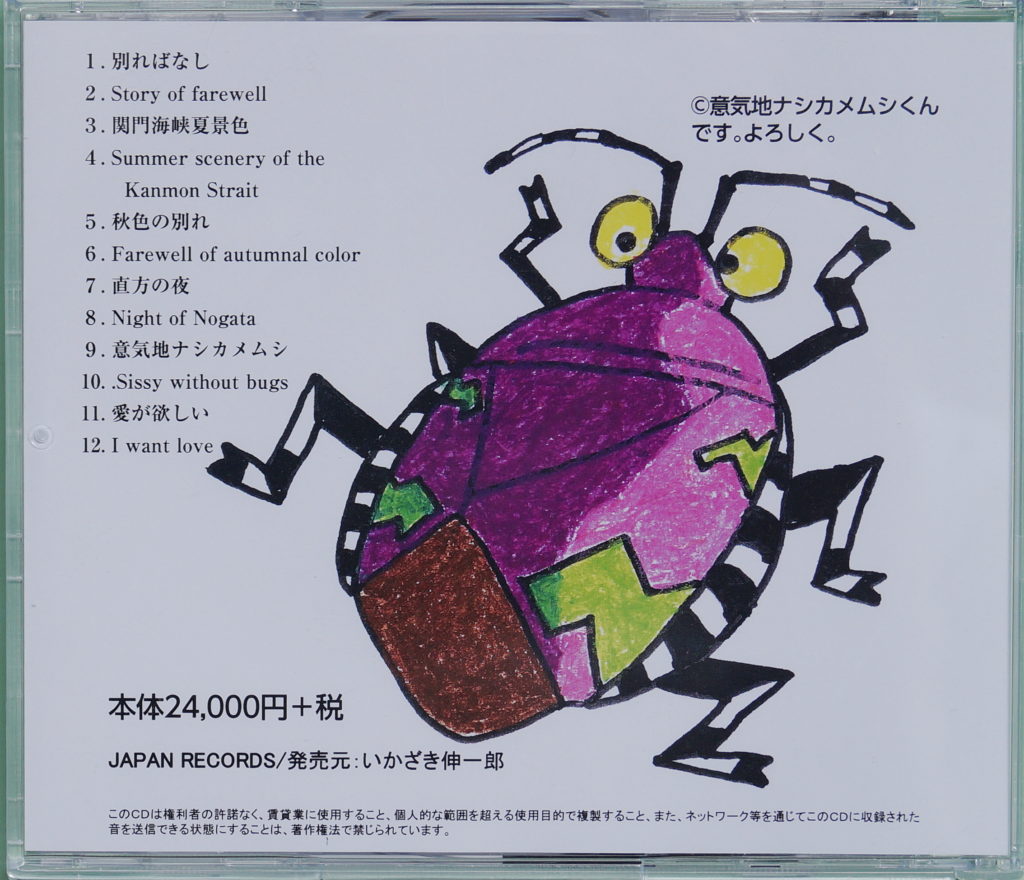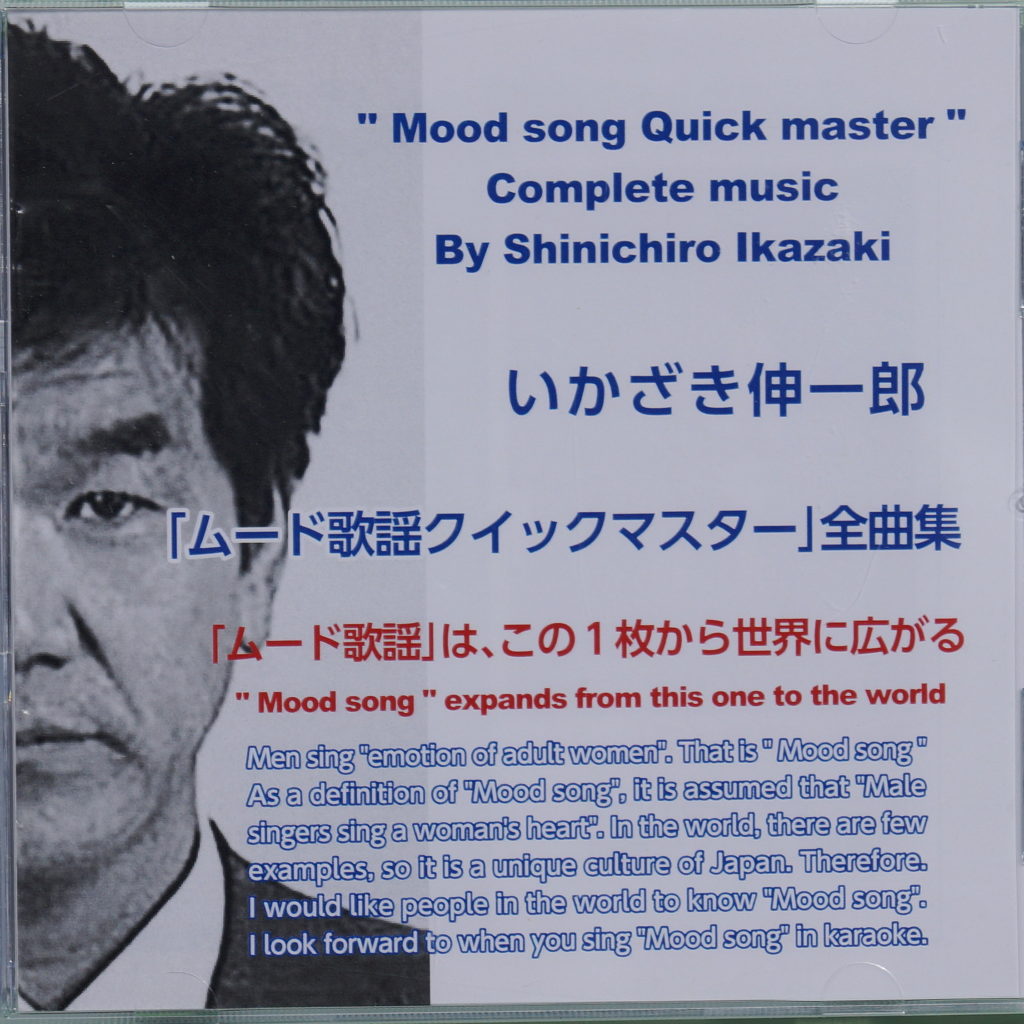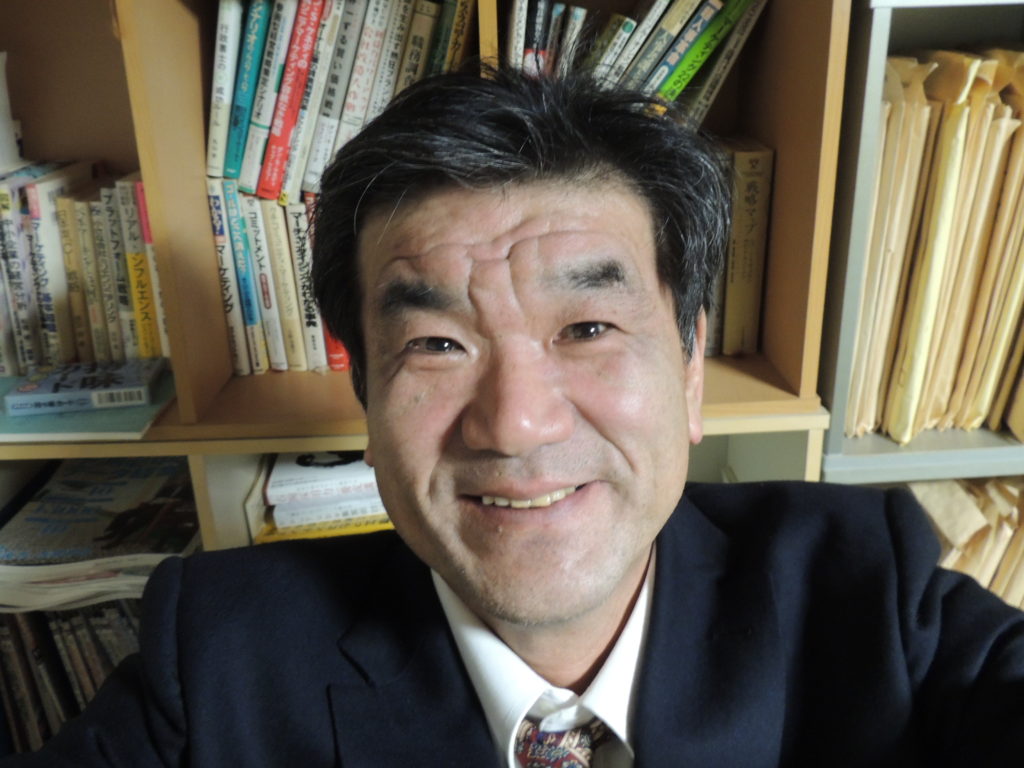
Singing with a concert 
Taking insects! 
Of course! Talk too. 
I’m working?
●ごきげんいかがですか?歌手のいかざき伸一郎です。
ムード歌謡を歌ってます。
では、さっそく聴いてください。「秋色の別れ」
●1番、(歌)「秋色の別れ」5分
●(MC)5分
(前に、付箋台を置き、スケッチブックを載せる)
(スケッチブック1枚目:「60歳から覚えてね!英単語コーナー」の文字見せながら)
ありがとうございました。(深く礼をする)
じつは私、今。英単語を覚えています。
ただ。年を取ったらダメですね。覚えることはできるのですが。その後は残念!
リアルに表現すれば、ザルで水をすくうようなもの。
せっかく覚えた英単語が、頭からザーザーとこぼれ落ちてしまいます。
Thank you very much
Actually, I am studying English words now.
However, it is not good if you get older. I can remember, but sorry afterwards!
After that, it will be disappointing.
If you express it realistically. Kind of like drawing water in a colander.
The English words that I have learned are spilled out of my head.
むかし。年表や英単語を覚えるための文書がありましたよね。
そして。一度覚えたら、忘れませんでしたよね。
そうです。そんな文書を、英単語ごとにつくればいいんです。
Old days. There were documents for memorizing chronological tables and English words.
And. Once you remember, you did not forget.
That’s right. Just create such a document for each English word.
そして。TOEICテストによく出る英単語が、手軽に覚えられるよう!
作詞家でもある私、いかざき伸一郎は、心に残るよう、英単語を作詞しました。
そして。その文書を、みなさんに紹介します。
「60歳から覚えてね!英単語」コーナー。を、開催します。お楽しみに~。
And. English words frequently used in the TOEIC test can be easily remembered!
Shinichiro Ikazaki, who is also a lyricist, wrote English words in a memorable way.
And. I will introduce that document to everyone.
The ” Japanese language course from 60 years old ” corner will be held.
Let’s looking forward to it!
では、さっそく、はじめます。
今回のテーマは、続はる。
(スケッチブック2枚目:「続はるで覚える英単語」の文字見せながら)
今回も。はる。続はる。です。
朝の空を 見上げて 今日という 一日が♪ よかったですね。・・・「365日の紙飛行機」
またかよ。AKB48のミニスカートじゃね~んかよ。ジャンジャン。
これは。ドラマ「あさが来た」の主題歌。女優の波瑠さんが出演していたので。
「びっくりぽん」の「はる」ですね。もう一度。ジャンジャン。
4月になって。「春」をカラダで感じたのに。5月になると、すぐに。もう暑くて暑くて。
昔に比べて。「春」が短く感じます。だから今回も。「春」を惜しむように。
「春」「貼る」「張る」「ハル」「晴」ましてや。女優の「波瑠」。ひらがなの「はる」。
まだまだ。今のうちに。春の陽気に誘われて。気持ちいい気分で。英単語を覚えましょう!
では。まずは、こちら。
So, let’s get started.
The theme this time is. Let’s learn Japanese with Haru and Spring again.
Asanosorawo miagete kyotoiu ichinichiga♪It was good! “365 days paper airplane ” sung by AKB48.
Is it again? What was good was not the miniskirt, but the song? Jean Jean!.
This is the theme song of the drama “Asa ga Kita”. The actress Ms Haru was appearing.
Therefore. It’s “Haru” from “Surprise Pon”. once again. Jean Jean.
In April, I feel “spring” in my body. However, it gets hot soon in May.
I feel that “spring” is shorter than in the past. I want to feel “spring” now.
There are “paste”, “tension”, “spring”, and “sunny”. Not to mention. There is also an actress “Haru”. So. The theme this time is “Haru” in hiragana again.
Not yet and not yet. It feels good to be invited by the spring weather. Let’s learn Japanese words like that feeling!
OK. First, here.
(スケッチブック3枚目:「下記の単語を書いた」の文字見せながら)
Enornous
非常に大きな、巨大な
イノーマス。非常に大きな、巨大な。という意味ですね。
はい。では。なぞかけのノリでいきますね。
イノーマス。とかけて。非常に大きな。と解く。その心は。
Enornous. Hijoniokina, Kyodaina. That means.
Yes. OK. I do it in a next way.
Enornous. Tokakete. Hijoniokina. Totoku. Sonokokorowa.
(スケッチブック4枚目:「下記の言葉を書いた」の文字見せながら)
大きいの~マス。非常に大きなサクラマス
まずは。「春」らしい「はる」で。桜の花がますます、サクラマス。「春」らしいですね。
はい。続いて。
Okiino~masu. hijoniokina sakuramasu.
First. It is “Haru” that seems to be “spring”. More and more cherry blossoms, cherry salmon. It seems to be “spring”.
Yes. continue.
(スケッチブック5枚目:「下記の単語を書いた」の文字見せながら)
Tell a lie
うそをつく
テラ ライ。うそをつく。という意味ですね。
テラ ライ。とかけて。うそをつく。と解く。その心は。
Tell a lie.Usowotsuku.That means.
Tell a lie. Tokakete. Usowotsuku. Totoku. Sonokokorowa.
(スケッチブック6枚目:「下記の言葉を書いた」の文字見せながら)
手洗いした?「した」と、うそをつく
「うそ」を言い張る。の「はる」ですね。
はい。ではつぎ。
Tearaishita?「shita」to, usowotsuku
It’s “Haru” that insists on “lie”.
Yes. Next.
(スケッチブック7枚目:「下記の単語を書いた」の文字見せながら)
Needless to say
言うまでもなく
ニードレスチュセイ。言うまでもなく。という意味ですね。
ニードレスチュセイ。とかけて。言うまでもなく。と解く。その心は。
Needless to say. Iumademonaku. That means.
Needless to say. Tokakete. Iumademonaku. Totoku. Sonokokorowa.
(スケッチブック8枚目:「下記の言葉を書いた」の文字見せながら)
言うまでもなく、パーティーにドレス。中世
これは。ドレスか~。値段が張るから、大きな出費。の「はる」ですね。
はい。つぎ。
Iumademonaku, pateini doresu. chusei.
Dresses are expensive. This is a big expense, “Haru”.
Yes. OK.
(スケッチブック9枚目:「下記の単語を書いた」の文字見せながら)
Truth
本当のこと
ツース。本当のこと。という意味です。
ツース。とかけて。本当のこと。と解く。その心は。
Truth. Hontonokoto. That means.
Truth. Tokakete. Hontonokoto. Totoku. Sonokokorowa.
(スケッチブック10枚目:「下記の言葉を書いた」の文字見せながら)
春日がツースと、本当のことを言った
春日。の「はる」ですね。
はい。では。
Kasugaga tsusuto, hontonokotowo itta.
This is Kasuga’s “Haru”.
Yes. OK.
(スケッチブック11枚目:「下記の単語を書いた」の文字見せながら)
Twice
二度
ツウィース。二度。という意味です。
では。ツウィース。とかけて。二度。と解く。その心は。
OK. Twice. Tokakete. Nido. Totoku. Sonokokorowa.
(スケッチブック12枚目:「下記の言葉を書いた」の文字見せながら)
春日は、ツウィースを二度言った
これも。春日。の「はる」ですね。
はい。では、つぎ。
Kasugaha, tsuisuwo nido itta.
This too. Kasuga’s “Haru”.
Yes. Then, next.
(スケッチブック13枚目:「下記の単語を書いた」の文字見せながら)
Ship
船、発送する
シップ。船、発送する。という意味です。
シップ。とかけて。発送する。と解く。その心は。
Ship. Fune, Hassosuru. That means.
Ship. Tokakete. Hassosuru. Totoku. Sonokokorowa.
(スケッチブック14枚目:「下記の言葉を書いた」の文字見せながら)
シーズンには、シップを貼り、永遠にお歳暮を発送する
見ての通り。シップを貼る。の「はる」ですね。
学生時代。アルバイトは。デパートで梱包作業してました。
はい。では。
Shizunniha, shippuwohari, eienni oseibowo hassosuru
As you can see. It is “Haru” that put a compress.
When I was a student, I worked part-time at a department store for packing.
Yes. OK.
(スケッチブック15枚目:「下記の単語を書いた」の文字見せながら)
My point
自分の主張
マイポイント。自分の主張。という意味です。
マイポイント。とかけて。自分の主張。と解く。その心は。
My point. Jibunnoshucho. That means.
My point. Tokakete. Jibunnoshucho. Totoku. Sonokokorowa.
(スケッチブック16枚目:「下記の言葉を書いた」の文字見せながら)
今のは、マイポイントと自分の主張を言う
これも。言い張る。の「はる」ですね。
はい。では、こちら。
Imanoha, maipointoto jibunnoshuchowo iu.
This is also the “Haru” of insistence.
Yes. Then here.
(スケッチブック17枚目:「下記の単語を書いた」の文字見せながら)
It’s easy to give up
あきらめるのは簡単だよね
イッツイージーツーギヴアップ。意味は。あきらめるのは簡単だよね。
イッツイージーツーギヴアップ。とかけて。あきらめるのは簡単だよね。と解く。その心は。
It’s easy to give up.Akiramerunoha kantandayone. That means.
It’s easy to give up. Tokakete. Akiramerunoha kantandayone. Totoku. Sonokokorowa.
(スケッチブック18枚目:「下記の言葉を書いた」の文字見せながら)
あきらめるのは簡単だよね、アイツ意地と、ギブアップせん
意地っ張りで、根性あるアイツです。
フレーズ「イッツイージーツー・・」「~するのは簡単」を使った「はる」ですね。
はい。では、こちらの。
Akiramerunoha kantandayone, aitsu ijito, gibuappusen.
He is a stubborn and gutsy guy.
This is “Haru” that uses the phrase ” It’s easy to・・”.
Yes. Then here.
(スケッチブック19枚目:「下記の単語を書いた」の文字見せながら)
Illicit
違法な
イリシトゥ。違法な。という意味です。
イリシトゥ。とかけて。違法な。と解く。その心は。
Illicit. Ihona. That means.
Illicit. Tokakete. Ihona. Totoku. Sonokokorowa.
(スケッチブック20枚目:「下記の言葉を書いた」の文字見せながら)
裏からはいり、知っと~、ここ違法な店
違法な店だから。料金は張るし。警察も張るし。の「はる」です。
Urakara hairi, shitto~, koko ihona mise.
It’s an illegal shop, so the price is high. And the police also keep an eye on it. It is such “Haru”.
Then the last.
(スケッチブック21枚目:「下記の単語を書いた」の文字見せながら)
Adolescent
青年期、思春期
アドレスセント。青年期、思春期。という意味です。
アドレスセント。とかけて。思春期。と解く。その心は。
Adolescent. Seinenki, Shishunki. That means.
Adolescent. Tokakete. Shishunki. Totoku. Sonokokorowa.
(スケッチブック22枚目:「下記の言葉を書いた」の文字見せながら)
彼女のアドレス、銭湯に忘れた、思春期の思い出
思春期。の「はる」ですね。アドレス帳を銭湯に忘れた。という意味ではあ~りません。
貴方は もう忘れたかしら♪「神田川」のようなイメージですね。
はい。では。最後に。一句。
Kanojono adoresu, sentoni wasureta, shishunkino omoide.
It’s adolescent “Haru”. I forgot my address book in the public bath. It doesn’t mean that. I wonder if you have forgotten it♪ It’s an image like “Kanda River”.
Yes. OK. Finally. A phrase.
(スケッチブック23枚目:「下記の句」の文字見せながら)
英単語 イチゴのハル取る スプリングゥ~
「ハル」とは。イチゴのヘタのこと。今は1年中あるから。春の旬じゃないみたいですね。
また。酸っぱくもないから。思春期の「あま酸っぱい思い出」もないですね。
心が「しゅん」。「はる」ものですね。ジャンジャン。
これで。あなたの頭と心に。しっかりと残りました。
と、いうことで。
I’m happy because I can eat strawberries in spring.
Now that I can eat strawberries all year round, it doesn’t seem to be the season for spring. Also, today’s strawberries are not sour. There are no “sweet and sour memories” of adolescence.
My heart is “Shun”. It’s a little sad. Jean Jean.
Yes, with this. On your head and heart. It remained firmly.
Yes. OK.
(スケッチブック24枚目:「下記の句」の文字見せながら)
「60歳から覚えてね!英単語コーナー」でした。
次回も。お楽しみに!ジャンジャン!
ありがとうございました。(深く礼をする)
では、聴いてください。「直方の夜」
” Let’s learn Japanese from 60! No.51 ” is over.
Next time. Let’s looking forward to it! Jean Jean!
Thank you very much (I bow deeply)
Then, please listen. ” Night of Nogata “
●2番、(歌)「直方の夜」5分
●ありがとうございました。(深く礼をする)
